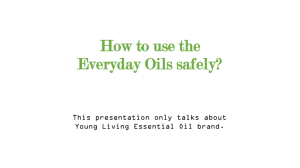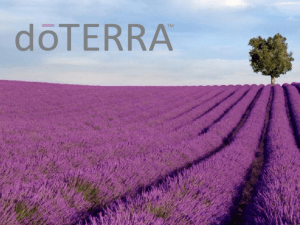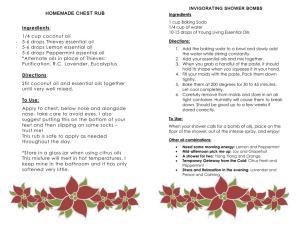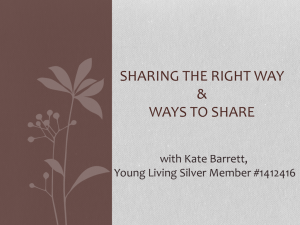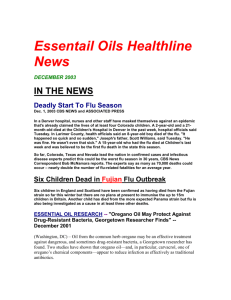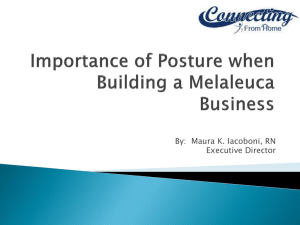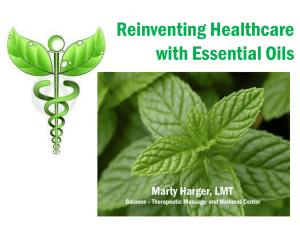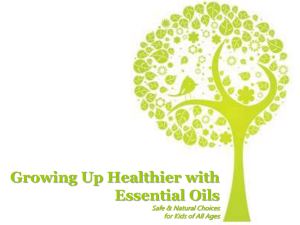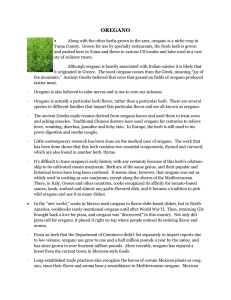prevents - All About Becoming
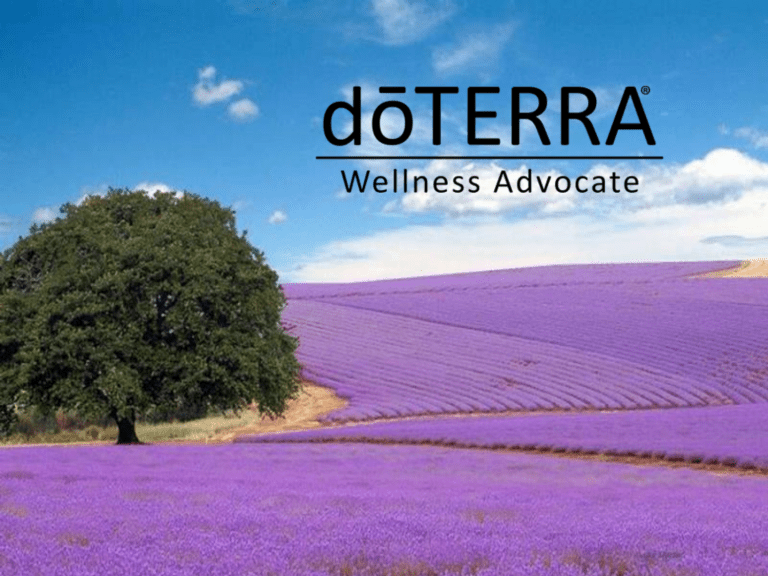
EDUCATE EMPOWER
dōTERRA does not
PREVENT
TREAT
CURE
•
Lifestyle PREVENTS disease
(diet, exercise, rest, stress management, toxic exposure)
•
Doctors TREAT symptoms and fix broken parts
•
The body CURES disease and heals itself
Before You Pop That Pill…
Ask three simple questions:
1.What are the side effects?
2.What are the benefits?
3.Is there a safer option?
A headache is not caused by an aspirin deficiency.
Battle of the Bugs:
Fighting Antibiotic Resistance
“According to the Centers of
Disease Control and Prevention
(CDC), virtually all significant bacterial infections in the world are becoming resistant to the antibiotic treatment of choice.
For some of us, bacterial resistance could mean more visits to the doctor, a lengthier illness, and possibly more toxic drugs.
For others, it could mean death.” www.fda.gov
New Steps Aimed at Cutting Risks from Acetaminophen
“The Food and Drug
Administration (FDA) has taken new steps to reduce the risks of severe liver injury associated with acetaminophen, a widely used pain- and-fever-reducing drug.
FDA is asking all makers of prescription products that contain acetaminophen to limit the amount of the drug to 325 milligrams per tablet or capsule.
www.fda.gov
Possible Increased Risk of Bone fractures with Certain Antacid Drugs
“Be aware that the over-thecounter PPIs should only be used as directed for 14 days of treatment of frequent heartburn. If your heartburn continues, talk to your health care professional. No more than three 14-day treatment courses should be used in one year.” www.fda.gov
FDA Taking Closer Look at
“Antibacterial” Soap
“New data suggests that the risks associated with long-term, daily use of antibacterial soaps may outweigh the benefits,” Rogers says. “There are indications that certain ingredients in these soaps may contribute to bacterial resistance to antibiotics, and may have unanticipated hormonal effects that are of concern to FDA.” www.fda.gov
A Natural Alternative to Synthetic Drugs
• An essential oil can have hundreds of different compounds
• Each compound has a different medicinal benefit
• Pharmaceutical companies mimic natural compounds
• Essential oils are antimicrobial
• Essential Oils are anti-inflammatory
• Essential Oils are powerful antioxidants
What is an essential oil?
ESSENTIAL OILS KILL
VIRUSES
AND
BACTERIA
• Antibiotics cannot penetrate cell membrane
• Essential oils CAN penetrate cells to kill viruses and bacteria
What Makes an Oil Impure
•
Enhancement of Compounds
•
Removal of Compounds
•
Addition of Compounds
•
Synthetic Variants
•
Impurities
•
Blending With Inferior
Grades Of Oil
Sourcing
• Habitat
• Cultivation
• Extraction
Chemical Analysis
• Organoleptic
• MicroBiological
• Heavy Metal
• Gas
Chromatography
• Mass Spectrometry
• FTIR
Sources
Peppermint
Clary Sage
Birch
Lavender
Basil
Thyme
Helichrysum
Cedarwood
White Fir
Marjoram
Rose
Grapefruit
Juniper
Melissa
Oregano
Fennel
Frankincense
Coriander
Rosemary
Cypress
Geranium
Hawaiian
Sandalwood
Vetiver
Wild Orange
Roman Chamomile
Lemon
Bergamot
Myrrh
Ginger
Black Pepper
Sandalwood
Lemongrass
Wintergreen
Cassia
Patchouli
Cilantro
Lime
Ylang Ylang Clove Eucalyptus Melaleuca
Cinnamon
Two essential oil extracts of the same species of plant can be pure, but can have significantly different chemical composition depending on:
Plant selection, growing conditions, harvest time, extraction method, and quality control processes
≠
Top Antioxidant
Foods
Cocoa Powder
(
Unprocessed
)
Acai Berry
Dark Chocolate
Prunes
Raisins
Blueberries
Blackberries
Strawberries
Spinach
Broccoli
Red Grapes
ORAC
Value
26,000
18,500
13,120
5,770
2,830
2,400
2,036
1,540
1,260
890
739
Top Antioxidant
Essential Oils
Clove
Myrrh
Coriander
Clary Sage
Melissa
Marjoram
Ylang Ylang
Ginger
Vetiver
Basil
Patchouli
4 drops of Clove Oil = 2,800 ORAC Value
ORAC
Value
1,078,700
379,800
298,300
221,000
134,300
130,900
130,000
99,300
74,300
54,000
49,400
Antioxidants: Why are they important?
“Antioxidants are substances that may protect your cells against the effects of free radicals. Free radicals are molecules produced when your body breaks down food, or by environmental exposures like tobacco smoke and radiation. Free radicals can damage cells, and may play a role in heart disease, cancer and other diseases.
Studies suggest that a diet high in antioxidants from fruits and vegetables is associated with a lower risk of cancer, cardiovascular disease, Parkinson's disease and
Alzheimer's disease.”
ESSENTIAL OIL SAFETY
Very safe and gentle with few side effects
Keep out of eyes, ears, and nose
Dilute with carrier oil, not water
Lavender Oil
• Most versatile of all essential oils—good for everything!
• Calming, relaxing, insomnia, mood elevating and balancing.
• Skin; encourages a youthful appearance.
• Burns, cuts, bruises, infections
• Hay fever, cold sores, ear aches
• Balances Pineal Gland
The effects of lavender oil inhalation on emotional states, autonomic nervous system, and brain electrical activity.
Results: Decreases of blood pressure, heart rate, and skin temperature, which indicated a decrease of autonomic arousal.
www.pubmed.gov
Lemon Oil
• soothe a dry or sore throat
• elevate mood
• clean kitchen counters
• take internally with water as a detox
•Regulates blood pressure
•Natural dirruretic
•Balances PH
•Keeps urinary tract clean
The effect of lemon inhalation aromatherapy on nausea and vomiting of pregnancy: a double-blinded, randomized, controlled clinical trial.
RESULTS:
There was a statistically significant difference between the two groups in the mean scores of nausea and vomiting on the second and fourth days (P = 0.017 and P = 0.039, respectively).
Peppermint Oil
•
Inhale to invigorate lungs and increase alertness
• apply to neck and forehead for headaches
• add to water in a spray bottle to mist body when overheated
• Fever, cool body temp.
• Bowel Inflammation
• Upset Stomach
• Digestion
• Circulation
• Allergies
The effect of a locally applied peppermint oil preparation on tension-type headache.
Results: There was no significant difference between the efficacy of 1,000mg of acetaminophen and 10% peppermint oil in ethanol solution.
Melalueca Oil
• use with shampoo for healthy scalp and hair
• apply to feet and toenails after showering or working out
• apply to skin blemishes and rashes
Comparison of hand hygiene antimicrobial efficacy:
Melaleuca alternifolia essential oil versus triclosan.
Results: referring to the soft soap, there was no difference between the performance of soap with 0.3%
Melaleuca Alternifolia and soap with 0.5% triclosan.
Oregano Oil
• immune support
• dilute and apply to bottom of feet as a natural defense
• use internally as part of a monthly cleansing regimen for GI health
Antibacterial activity of oregano against gram positive bacteria.
Results: Of the eight oils tested, oregano was the most effective. It inhibited growth of all three strains of bacteria with a very large zone.
Frankincense Oil
• use to clean and dress minor cuts and sores
• use with a carrier oil for beautiful, radiant skin
• apply to bottom of feet or use internally for immune function
• Depression, Anxiety and Stress Related
Conditions
• Nerve Tonic
• Immune Stimulation
• Thyroid Support
Anti-inflammatory efficacy of Boswellia frereana extracts in an in vitro model of cartlige degeneration
.
Results: we have demonstratred that B. frereana prevents collagen degradation, and inhibits the production of porinflammatory mediators and MMPs.
Medical Uses of Frankincense
• Bronchial Asthma
• Arthritis
• Inflammatory Bowel Disease Ulcerative Colitis
• Anti-bacterial and Anti-fungal Activities
• Inhibit Glioma (brain tumor) Growth in Animal
Models
• Improve Clinical Outcomes Glioma and
Suppress Breast Cancer Metastasis in Patients
ON GUARD ® Oil
• dilute in spray bottle to clean surfaces
• dilute and gargle morning and night as a protective mouth rinse
• take drops in an empty gel capsule for added immune support
• Kills harmful bacteria, mold, and viruses
• Blood sugar support
• Colds, flu
Protective essential oil attenuates influenza virus infection: an in vitro study in MDCK cells.
Conclusion: an essential oil blend significantly attenuates influenza virus PR8 infectivity in vitro without affecting viral binding or cellular internalization in MDCK cells. Oil treated virus continued to express viral mRNAs but had minimal expression of viral proteins, suggesting that the antiviral effect may be due to inhibition of viral protein translation.
Antibiotic capsule: (I tried several, but this one worked best) 3 drops each oregano, melaleuca, thyme, rosemary, frankincense. You need to start taking this the minute you feel something coming on. You can take this every hour until you start feeling better or at least take it every time you start feeling a bit of a sore throat or feeling cruddy or achy. I also took it every time I started to cough.
Sore throat: Frankincense straight down. (I tried melaleuca, but the Frank worked better.) Try both if you want and see what works best for you. Tastes nasty. Works fast.
Cough: 2 drops each lemon, cassia (Use cinnamon for kids) and myrrh on a spoon with coconut oil. I took this everytime I started to cough and before I went to bed so I could sleep.
Drink lemon and even cassia in your water. Use
Onguard throat drops.
Spine: Layer Frankincense, coconut oil, oregano, thyme, on guard, aromatouch, lemongrass, melaleuca, arborvitae, peppermint. (If someone will put a hot towel, garbage bag and blanket on your back after this it will help the most, but at least get them on your spine.)
Breathe and cardamom on chest.
(sometimes I put a heater bag on my chest after I put the oils on, just because it feels good.)
Breathe and onguard in epsom salts and soak in tub.
I also take all the supplements:
Vitamins (lifelong vitality pack), terrazymes, zendocrine and PB
Assist (probiotics). I know these helped me out, too, getting nutrition in and flushing toxins out.
Take Control of Your Family’s Healthcare!
• Contact the person who invited you to this event.
• Set up your wholesale account.
• Share with your family and friends.
